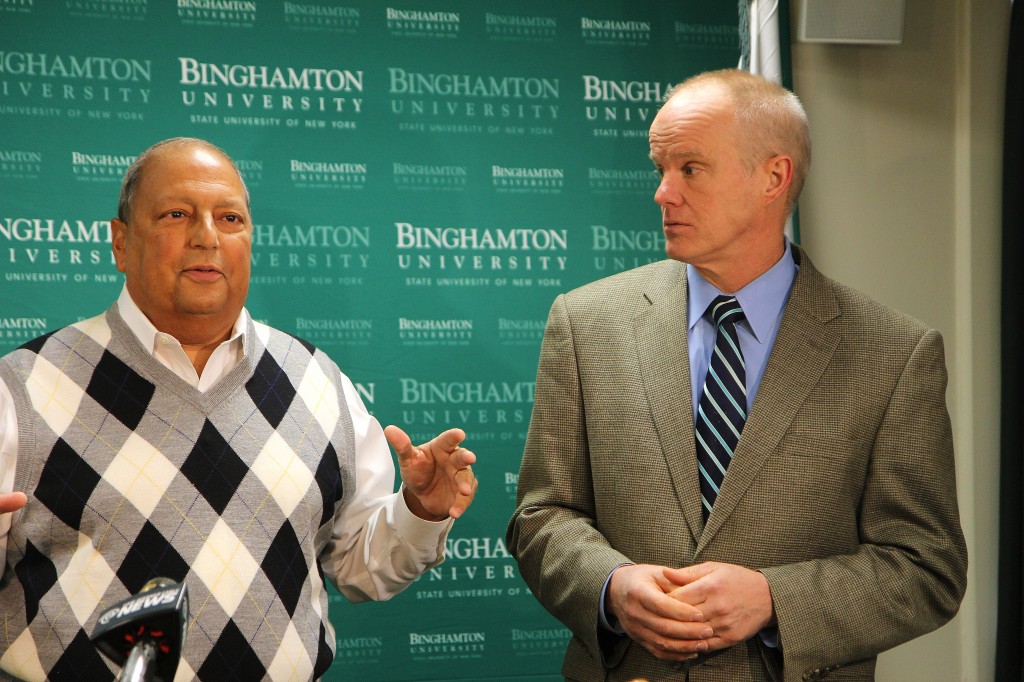
Plans to build a pharmacy school at Binghamton University became more tangible last Monday when Gov. Andrew Cuomo announced his support in the form of a $10 million budget allocation.
“The process for developing a school of pharmaceutical sciences and pharmacy started almost two years ago … with a planning process that involved faculty and staff on campus to develop a business plan and a curriculum plan, as well as a research plan for this program,” BU President Harvey Stenger said at a press conference.
Stenger and New York State Sen. Tom Libous announced Monday that the school will likely be built in Johnson City, in close proximity to the UHS Wilson Medical Center.
“Putting this next to a major hospital obviously makes sense. That doesn’t mean we’re not going to work with all the major hospitals — of course we are, we have a great relationship,” Libous said.
Before a pharmacy school can open, it will have to be approved by both SUNY and the New York State Education Department, as well as receive accreditation from the American Council of Pharmacy Education.
But Stenger and Libous are confident that plans will move forward rapidly in the coming months.
“The governor was very clear to me that this is not just a $10 million startup or planning — no, this is beyond planning. This is the beginning of acquisitions so that we can make the school become a reality,” Libous said.
According to Stenger, the pharmacy school could be finished in the next several years.
“Our plan is to have our first group of students in the fall of 2017, but with this announcement we’re going to try to push that a little bit faster, maybe fall of 2016,” Stenger said. “So students who are undergraduates right now could be planning on staying here for their pharmacy degree.”
Sarah Netz, a senior majoring in biochemistry, is attending University of Saint Joseph’s School of Pharmacy next year, but she said that if BU already had a pharmacy school, it “wouldn’t even be a question — I would go here.”
“I am honestly very jealous of those students who will have the opportunity to go to pharmacy school here,” Netz said. “I think a lot of undergrads will be interested in it; it gives pre-health majors more options than just doctor, dentist and nurse.”
Stenger said BU undergraduate students would be able to apply to a 2-4 program — two years of undergraduate and four years of graduate school — either directly out of high school or as undergraduate students at BU. Non-BU students could apply to a traditional four-year graduate program.
Stenger said he anticipates hiring 20-30 full-time faculty members for the new school, which would house 240-300 students in both Doctor of Pharmacy and Ph.D. programs. The project is estimated to cost about $60 million to complete.
“This is a growth field,” Stenger said. “Pharmacists now are primary caregivers in many communities, and we expect that our pharmacist graduates will be highly respected.”
“But we also believe that this will attract research funding in the area of pharmaceutical sciences,” he said. “Drug development, clinical trials, as well as drug delivery method are areas of research that are very fertile and we anticipate that through the research that this school will do that we’ll be able to attract large businesses as well as some small companies to the area to work closely with our faculty to develop new technologies in the area of pharmaceutical sciences.”
Netz agreed that strong research programs would benefit the University.
“Binghamton is so strong when it comes to research so I am excited to see the direction it goes,” Netz said.
To put the plans in motion, Stenger said timing will be key, and “we have to show progress as rapidly as possible.”
“Within a year we certainly want to have the site in control, have it cleared, have utilities start to be brought in and have a design almost complete,” Stenger said. “We have to have as fast a process as possible in this initial phase so that we can make sure that the commitment for future funds is talked about.”
In addition to the planned funds for the new pharmacy school, Cuomo’s higher education plan also includes $8 million for scholarships to high school students who will be attending SUNY or CUNY to pursue a career in the STEM (science, technology, engineering and math) field. The scholarships will be offered to the top 10 percent of high school graduates who promise to pursue a STEM career in New York state for at least five years after graduation.
Cuomo’s budget plan also included funds to expand another round of NYSUNY 2020 and NYCUNY 2020. $55 million would be available for the SUNY system. Campuses will present plans for academic improvement, and the best plans will be awarded the most money. According to the budget proposal, plans that promote economic development and improve students’ ability to enter the workforce will be granted the most money. Priority will also be given to schools who increase efficiency with online classes and technology. Many of these elements are reminiscent of the Obama administration’s plan for higher education, which the president unveiled in a tour of upstate New York and Pennsylvania in August. The goal of this round of SUNY 2020 is to get students working after graduation, hopefully in New York.


